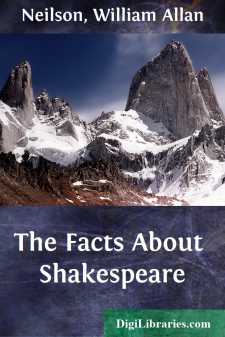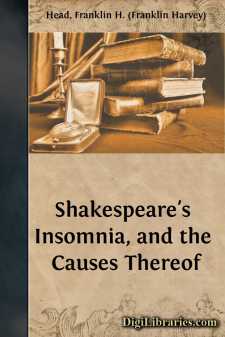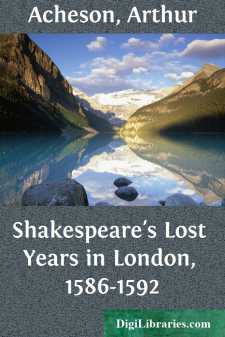Literary Criticism
- American 18
- Ancient and Classical 3
- Asian 1
- Australian & Oceanian 1
- Books & Reading 8
- Caribbean & Latin American 2
- Drama 2
- English, Irish, Scottish, Welsh 49
- European 7
- General 37
- Horror 1
- Humor 2
- Jewish 2
- Medieval 2
- Middle Eastern 3
- Poetry 7
- Renaissance 6
- Russian & Former Soviet Union 1
- Shakespeare
Shakespeare Books
Sort by:
by:
Samuel Johnson
TRAGEDIES Vol. IV (392) Most of the notes which the present editor has subjoined to this play were published by him in a small pamphlet in 1745. I.i (393,*) Enter three Witches] In order to make a true estimate of the abilities and merit of a writer, it it always necessary to examine the genius of his age, and the opinions of his contemporaries. A poet who should now make the whole action of his...
more...
Shakespeare's England and London Shakespeare lived in a period of change. In religion, politics, literature, and commerce, in the habits of daily living, in the world of ideas, his lifetime witnessed continual change and movement. When Elizabeth came to the throne, six years before he was born, England was still largely Catholic, as it had been for nine centuries; when she died England was...
more...
by:
Anonymous
INTRODUCTION The identity of the "Anonymous" of Some Remarks on Hamlet Prince of Denmark has never been established. The tradition that Hanmer wrote the essay had its highly dubious origin in a single unsupported statement by Sir Henry Bunbury, made over one hundred years after the work was written, in his Correspondence of Sir Thomas Hanmer, with a Memoir of His Life (London, 1838), to the...
more...
by:
Charles Lamb
There was a certain island in the sea, the only inhabitants of which were an old man, whose name was Prospero, and his daughter Miranda, a very beautiful young lady. She came to this island so young, that she had no memory of having seen any other human face than her father's. They lived in a cave or cell, made out of a rock; it was divided into several apartments, one of which Prospero called his...
more...
by:
Jesse Johnson
INTRODUCTORY The Shakespearean Sonnets are not a single or connected work like an ordinary play or poem. Their composition apparently extended over a considerable time, which may be fairly estimated as not less than four years. Read literally they seem to portray thoughts, modes or experiences fairly assignable to such a period. Though variable and sometimes light and airy in their movement, the...
more...
by:
Edmund Gosse
I. The greatest poet of our age has drawn a parallel of elaborate eloquence between Shakespeare and the sea; and the likeness holds good in many points of less significance than those which have been set down by the master-hand. For two hundred years at least have students of every kind put forth in every sort of boat on a longer or a shorter voyage of research across the waters of that unsounded...
more...
by:
Samuel Johnson
Dr. Johnson's Preface to Shakespeare is one of the most famous critical essays of the eighteenth century, and yet too many students have forgotten that it is, precisely, a preface to the plays of Shakespeare, edited by Dr. Johnson himself. That is to say, the edition itself has been obscured or overshadowed by its preface, and the sustained effort of that essay has virtually monopolized scholarly...
more...
The plays known as Shakespeare's are at the present time universally acknowledged to be the "Greatest birth of time," the grandest production of the human mind. Their author also is generally recognised as the greatest genius of all the ages. The more the marvellous plays are studied, the more wonderful they are seen to be. Classical scholars are amazed at the prodigious amount of...
more...
I. Insomnia, the lack of "tired Nature's sweet restorer," is rapidly becoming the chronic terror of all men of active life who have passed the age of thirty-five or forty years. In early life, while yet he "wears the rose of youth upon him," man rarely, except in sickness, knows the want of sound, undreaming sleep. But as early manhood is left behind and the cares and perplexities...
more...
by:
Arthur Acheson
CHAPTER I INTRODUCTORY The most interesting and important fifteen years in the records of English dramatic literature are undoubtedly those between 1588 and 1603, within which limit all of Shakespeare's poems and the majority of his plays were written; yet no exhaustive English history, intelligently co-ordinating the social, literary, and political life of this period, has ever been written....
more...











